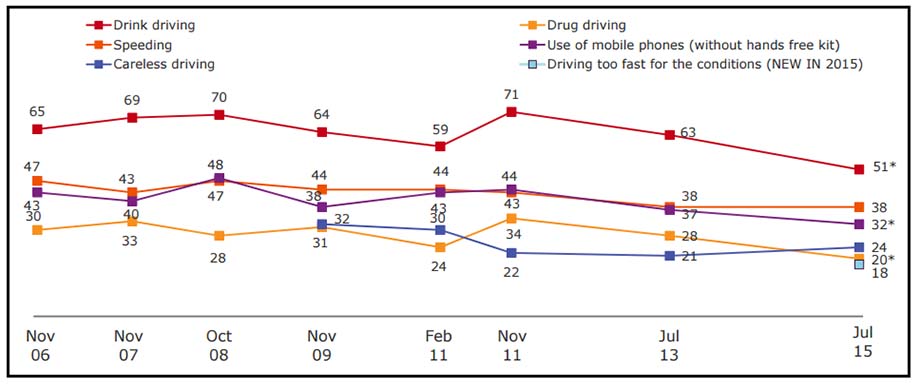Young Drivers Must Combat The Fatal Four Driving Offences
Mar 28 2022 2:11PM
Leicestershire Fire and Rescue Service are working to combat the 4 most common driving offences committed by young drivers, which they are dubbing ‘The Fatal Four’.
Fatal Four Driving Offences
- Speeding
- Not wearing seatbelts
- Drink and Drug driving
- Using mobile phones whilst driving
Schools are encouraged to download the available resources on their website and teach their pupils about the dangers of committing these driving offences. But just how fatal are these four?
Speeding
People seem to be unaware just how much of an impact speeding has. Did you know that if the average speed of a UK driver dropped by just 1 mph, it could reduce road fatalities by 5%. Considering 10% of road accidents can be attributed to some sort of excessive speeding, it’s definitely something worth monitoring. Statistically, young males commit the most speeding offences, but everyone could benefit from being a bit more cautious with their speed.
Seatbelts
Though made compulsory in 1983, even nowadays some motorists don’t wear them whilst driving. In 2014, tens of thousands of motorists were penalised for not wearing seatbelts, with some younger drivers saying they did not feel they had to wear a seatbelt on a short journey (Daily Mail). The truth is you never know when you might have an accident, so you should always put your seatbelt on regardless of the journey length. Seatbelts are estimated to reduce your risk of a Fatal Injury by 50%, a Major Injury by 45% and a Minor Injury by 20% (RoadSafetyObservatory), so be sure to wear one on your next drive.
Drink & Drug Driving
Drink driving has been a buzz word in our society for years. The punishments for driving whilst intoxicated include a fine, a driving ban and a prison sentence in serious cases. To top it off, driving whilst intoxicated will invalidate your insurance if you have an accident. According to Brake, people in their mid-20s are the most likely to take unnecessary driving risks, such as driving on drugs or alcohol. Young people seem to disregard just how much an intoxicated mind can impair their driving - See our graphic, which reveals exactly how alcohol affects a driver’s brain – Click here
Mobile Phones
Though people of all ages are guilty of using their phone whilst driving, according to RoSPA, the highest proportion are young drivers. It’s not worth doing, as research by Brake has shown 98% of all drivers who get distracted will experience a deterioration in their driving ability. If you are a young driver, you may not be very experienced at this stage of your driving life, so even a simple distraction can hold serious consequences. This is even more prevalent now that ministers want to double the penalty for using your mobile phone whilst driving, changing it from 3 penalty points to 6. This would mean an automatic ban for drivers who have held their licence for less than 2 years.
UK motorists' attitudes towards road safety
In recent years there has been a decline in motorist’s appreciation for issues around drink driving, speeding
and using mobile phones. Just have a look at this data from a recent Gov survey. The graph represents the percentage of motorists
who believe that issues listed below should be the government’s priority, for example 65% of people* asked in
November 2006 believed that drink driving should be a priority for the government. *Please note that people were
able to select multiple answers resulting in a total higher than 100%.  With more awareness of the Fatal Four, hopefully drivers can re-appreciate how important these issues are.
Article Links Brake – Drink Driving Brake – Drug Driving Brake – Distracted Driving RoSPA – Mobile Phones RoSPA - Speeding
With more awareness of the Fatal Four, hopefully drivers can re-appreciate how important these issues are.
Article Links Brake – Drink Driving Brake – Drug Driving Brake – Distracted Driving RoSPA – Mobile Phones RoSPA - Speeding

